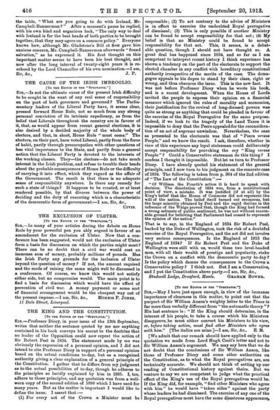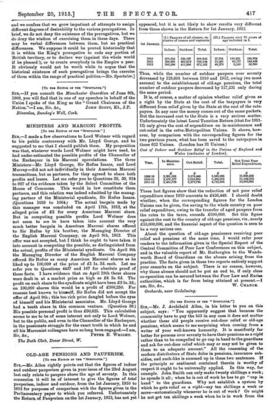[To THE EDITOR OP THE "SPECTATOR. "]
Sin,—May I have just space enough, in view of the immense importance of clearness in this matter, to point out that the purport of Sir William Anson's weighty letter to the Times is far more than verbally different from " the automatic theory " ? His last sentence is : " If the King should determine, in the interest of his people, to take a course which his Ministers disapprove, he must either convert his Ministers to his view, or, before taking action, must find other Ministers who agree with him." [The italics are mine.]—I am, Sir, &c., E. It.
[We admit that our remark should have applied only to the quotation we made from Lord Hugh Cecil's letter and not to Sir William Anson's argument. We may say here that we do not doubt that the conclusions of Sir William Anson, like those of Professor Dicey and some other authorities on the Constitution, as to what the Royal prerogatives are, are technically accurate. We should not think of setting up our reading of Constitutional history against theirs. But we venture to say we are competent to judge what the practical effect of the King's use of the Royal prerogatives would be. If the King did, for example, "find other Ministers who agree with him " he would have " taken sides" against the party whose leaders he had dismissed. The exercise of any one of the Royal prerogatives must have the same disastrous appearance, and we confess that we grow impatient of attempts to assign different degrees of desirability to the various prerogatives. In brief, we do not deny the existence of the prerogatives, but we do deny the wisdom of exercising them in these days. There may be verbal differences between them, but no practical differences. We suppose it could be proved historically that it is within the King's prerogative to cede any portion of British territory, or to declare war (against the whole world if he pleased !), or to create everybody in the Empire a peer. It obviously would not be worth while to argue that the historical existence of such prerogatives brings the exercise of them within the range of practical polities.—En. Spectator.]











































 Previous page
Previous page